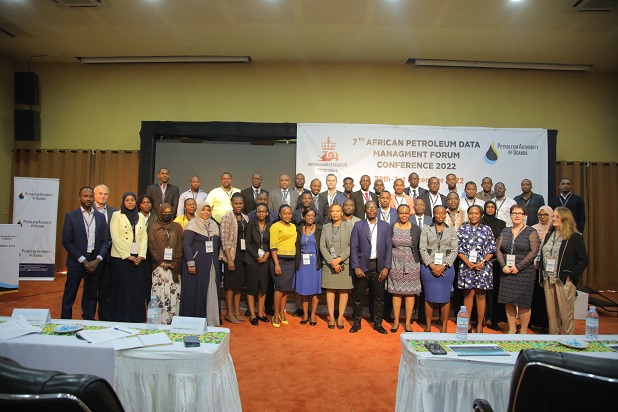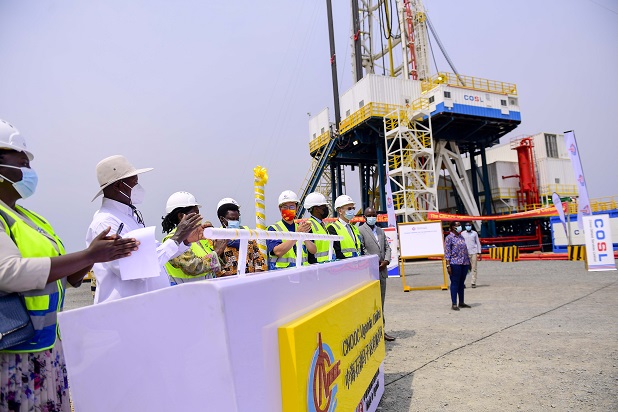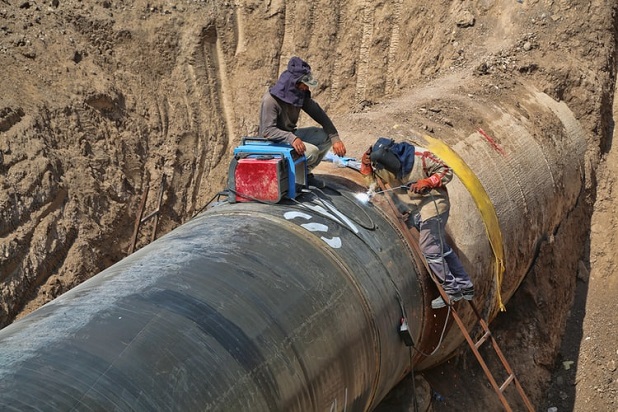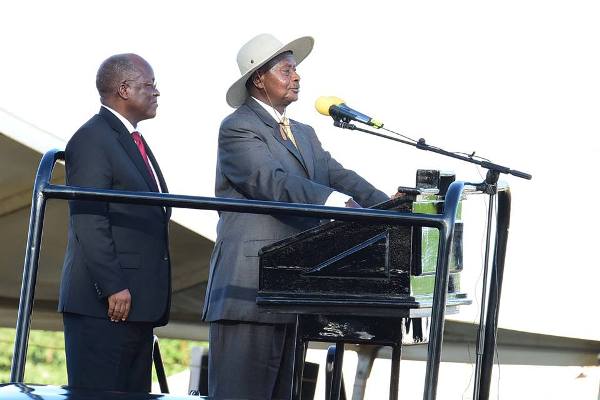The APDMF Members at the Opening Ceremony
The 7th African Petroleum Data Management Forum Conference (APDMF) has officially opened at the Commonwealth Resort, Munyonyo – Kampala, with a call to participating countries to make petroleum data more valuable.
The APDMF comprises of representatives from key government entities from different countries concerned with policy, regulatory and commercial aspects of the sector. This forum provides an opportunity for benchmarking on best practices, while sharing experiences among the countries and institutions represented.
While officially opening the APDMF 2022, Mr. Ernest Rubondo, the Executive Director of the Petroleum Authority of Uganda (PAU) challenged the participants to use the 7th Forum to chat a way forward on how African countries can make Petroleum Data more valuable and accessible to those that wish to make use of it.
“The increase in data volumes comes with the challenges of efficiently managing the data and efficiently using the data to make decisions hence the important need to leverage on the 4th Industrial Revolution (4IR) technologies such as Internet of Things (IoT), Cloud Computing, and Big Data Analytics, among others. However, leveraging 4IR technologies comes with huge investments in both the technologies and the human resources”, said Mr. Rubondo.
Mr. Rubondo added that; “there was need to make Petroleum Data accessible to researchers especially from Universities in Africa to undertake more studies that can make the data more valuable to the countries that own it”.
The APDMF is an annual conference organised by the Norwegian Petroleum Directorate (NPD) in conjunction with the Petroleum Regulatory body of the host country.
Mr. Sjøgren Gunnar, the Project Director, NPD, said this this year’s theme, “Seven Years of cooperation in Petroleum Data Management: Looking to the future”, is aimed at helping the countries the NPD cooperates with to leverage on how best they can use their petroleum data.
“Today marks seven years since we started this collaboration. As you can all see, we have come a long way and much as we didn’t meet physically for the last two years because of COVID-19, we are happy to be where it all started”, said Mr. Gunnar.
This year’s ADMF has participants from eight countries that have a corporation agreement for support on data management and storage with the NPD. These include Norway, Ghana, Kenya, Mozambique, Somalia, Sudan, Zanzibar, and Uganda.
“Our philosophy is building capacity and competence for all countries willing to collaborate with us. And this we have done with Uganda and the other countries willing to learn from our experiences on how best to manage their oil resources”, said Mr. Gunnar.
Mr. Gunnar added that when they started collaborating with Uganda, all data was stored in analogue format, but the country was supported to establish a digital database.
Uganda is now into the Development phase of the oil and gas value chain, which includes the setting up of development, production, processing, and transportation facilities. Vast quantities of data are therefore expected from the drilling of over 450 Development wells in the Kingfisher and Tilenga Development projects, as well as from the Refinery and the East African Crude Oil Pipeline projects. The data is expected to be transmitted in real-time from the oil fields and infrastructure projects to the planned Real Time Monitoring Centre (RTMC) at the PAU’s offices in Entebbe.
Mr. Rubondo revealed that as the custodian of Uganda’s Petroleum and other related data, the Authority manages over 50 terabytes of data. A significant portion of this data was acquired during the oil and gas exploration phase.
“The electronic data volumes are expected to increase from the current about 50 Terabytes to 650 Terabytes at the start of oil production in 2025, rising to over 1 Petabyte in 2026,” Mr Rubondo revealed.

Quoting a British mathematician Clive Humby who coined the phrase, “Data is the new oil”, Mr. Rubondo said it is true that the oil industry is heavily reliant on the use of data to inform decision making. It is also true that just like oil, for data to be useful, it must be processed and applied efficiently.
Mr. Daniel Arthur, a data management specialist from the Petroleum Commission of Ghana applauded Uganda for properly managing and storing its Petroleum Data which has enabled it progress to the development and production phase.
“Uganda has done extremely well; we have collaborated with them closely and you can see that they easily correlate the old data acquired with the new data. We share everyday experiences, resources, and challenges of data management”, said Arthur.
The 7th ADMf conference that was opened on Tuesday 29th November 2022 will run for three days ending on 1st December 2022.
The team will visit the PAU Data Centre and Core Store in Entebbe as one of the activities for this year’s ADMf.





